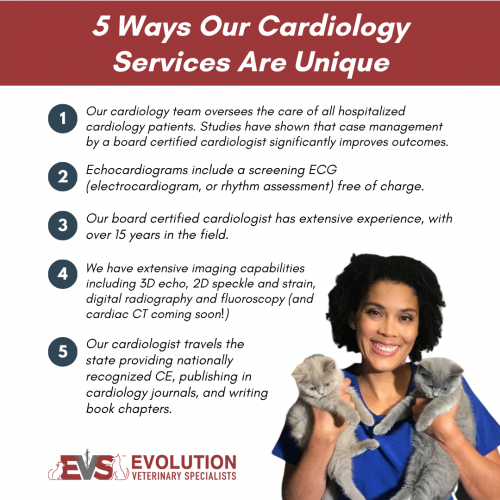Discovering the Vital Providers Supplied by a Veterinary Cardiologist: Understanding Ultrasound and CT Scan Methods
Vet cardiologists play a vital role in the wellness of pets by diagnosing and treating numerous heart problems. They use sophisticated imaging strategies, such as heart ultrasound and CT scans, to provide precise assessments. Each approach has its distinctive advantages and applications. Comprehending these strategies is vital for family pet proprietors looking for the ideal treatment for their buddies. What aspects should pet dog owners take into consideration when picking between these analysis tools?

The Function of Veterinary Cardiologists in Pet Dog Health Care
Veterinary cardiologists play a vital duty in the health care of pets, focusing especially on identifying and dealing with heart-related problems. They possess specialized training that allows them to analyze intricate diagnostic examinations and identify numerous cardio problems. These experts utilize advanced methods, such as echocardiography and electrocardiography, to analyze heart function and structure accurately.Veterinary cardiologists likewise develop customized treatment strategies that might include drugs, way of living modifications, and, in some instances, medical interventions. Their experience expands to educating pet proprietors regarding heart wellness, stressing the significance of routine examinations and early discovery of potential issues. Collaboration with basic veterinarians is crucial, as it assures comprehensive care for pets with believed heart concerns. By supplying specialized solutions, vet cardiologists greatly enhance the lifestyle for pets and supply satisfaction for their owners, reinforcing the value of heart health and wellness in overall family pet wellness.
Usual Cardiac Problems in Animals
Common heart problems in animals can greatly affect their health and lifestyle. Heart murmurs, different kinds of cardiomyopathy, and genetic heart defects are amongst one of the most prevalent conditions that vets come across. Board Certified Veterinary Cardiologist. Understanding these concerns is crucial for animal owners to assure prompt medical diagnosis and ideal treatment
Heart Murmurs in Pets
Heart whisperings can be a source of worry for pet owners, they are not always a measure of significant wellness issues. A heart whispering is an unusual noise generated by rough blood flow within the heart. In animals, these whisperings can be triggered by various aspects, consisting of hereditary heart flaws, shutoff problems, and even tension throughout evaluations. Lots of family pets with heart whisperings lead regular lives without significant health influences. To establish the underlying cause, veterinary cardiologists often use analysis methods such as echocardiograms and Doppler ultrasounds. Early discovery and analysis are vital, as they might help take care of any type of potential heart concerns properly. Animal owners are encouraged to consult their vet for a detailed evaluation if a heart murmur is discovered.
Cardiomyopathy Kind Explained
Cardiomyopathy incorporates a team of diseases influencing the heart muscular tissue, causing jeopardized cardiac feature in family pets. One of the most common types include dilated cardiomyopathy (DCM), hypertrophic cardiomyopathy (HCM), and restrictive cardiomyopathy (RCM) DCM primarily affects pet dogs, triggering the heart to deteriorate and expand, which diminishes its capability to pump blood efficiently. On the other hand, HCM is a lot more prevalent in pet cats, defined by the enlarging of the heart wall surfaces, typically leading to obstructed blood flow. RCM, though less typical, happens when the heart muscle becomes rigid, limiting its capability to full of blood. Each type presents one-of-a-kind difficulties in medical diagnosis and treatment, necessitating specialized veterinary cardiological examination to ensure peak monitoring and care for impacted pets.
Congenital Heart Issues
Hereditary heart problems represent a substantial category of heart concerns in pets, distinct from gotten conditions such as cardiomyopathy - Cancer Veterinary Near Me. These issues are architectural problems present at birth, influencing the heart's normal function. Typical types include license ductus arteriosus, ventricular septal issues, and pulmonic stenosis. Signs and symptoms may differ commonly, ranging from mild to severe, and can include exercise intolerance, coughing, and difficulty breathing. Early diagnosis through advanced imaging strategies like ultrasound is essential for reliable management. Vet cardiologists play an important role in identifying these conditions and advising proper therapy choices, which might consist of clinical administration or surgical treatment. Identifying congenital heart issues permits much better results and improved lifestyle for influenced family pets
Understanding Cardiac Ultrasound: Just How It Works
A considerable variety of veterinary practices currently utilize cardiac ultrasound as an important diagnostic tool for evaluating heart health and wellness in animals. This non-invasive technique utilizes high-frequency acoustic waves to produce pictures of the heart's structure and feature. Throughout the procedure, a veterinary technician applies a gel to the animal's chest and makes use of a transducer to send out ultrasound waves. These waves jump off the heart and bordering frameworks, creating real-time photos on a monitor.Veterinarians can evaluate various facets of heart health, including chamber dimension, wall surface movement, and shutoff feature. Furthermore, heart ultrasound permits the discovery of abnormalities such as fluid build-up and genetic heart defects. This strategy is vital for detecting conditions that may not show up through conventional radiographs. By supplying in-depth information about the heart's composition and performance, cardiac ultrasound help in creating effective therapy prepare for animals enduring from heart problem.
The Importance of CT Scans in Detecting Heart Issues
Just how do CT scans boost the diagnosis of heart conditions in vet medicine? CT scans offer in-depth cross-sectional photos of the heart and surrounding structures, enabling veterinarians my sources to imagine intricate physiological partnerships. This imaging technique is particularly beneficial in identifying genetic heart flaws, heart growths, and abnormalities in blood vessels. By utilizing advanced imaging algorithms, CT scans can analyze heart chamber dimensions and function, offering a comprehensive sight that might be tough to accomplish with conventional methods.Additionally, CT angiography can imagine blood flow and determine locations of constriction or blockage, which is vital for planning prospective treatments. The rate and accuracy of CT scans additionally promote fast medical diagnoses, important in emergency situation circumstances. Eventually, the incorporation of CT checks right into vet cardiology substantially improves the accuracy of diagnoses, making it possible for targeted therapy strategies and enhancing individual outcomes for pets dealing with heart disease.
Contrasting Ultrasound and CT Scan Strategies
While both ultrasound and CT scans are invaluable tools in veterinary cardiology, they supply distinct advantages and limitations that influence their use in identifying heart disease. Ultrasound, or echocardiography, gives real-time imaging of the heart's framework and function, enabling vets to evaluate heart chambers, valves, and blood circulation. It is particularly effective for evaluating conditions like congestive heart failure and cardiomyopathy. Ultrasound may be restricted in envisioning specific physiological structures due to person size or obesity.In comparison, CT checks deal thorough cross-sectional pictures of the heart and bordering cells, making them ideal for determining structural abnormalities, tumors, or vascular problems. CT scans give complete understandings, they need sedation and may include radiation exposure. Eventually, the selection in between ultrasound and CT scans depends upon the specific clinical situation, the individual's problem, and the details needed for an accurate medical diagnosis.
Treatment Alternatives Available Via Vet Cardiology
Vet cardiology offers a series of treatment alternatives tailored to address different heart disease in animals. Therapy plans typically begin with lifestyle alterations, including diet plan modifications and exercise modifications, targeted at enhancing overall heart wellness. Medicines play an important function, with cardiologists prescribing medicines such as diuretics, beta-blockers, and ACE inhibitors to manage signs and boost cardiac function.In much more severe instances, interventional treatments, such as balloon valvuloplasty or stent placement, may be required to alleviate blockages or enhance blood circulation. For specific genetic heart flaws, surgical choices may be explored to deal with structural problems. Furthermore, continuous surveillance and follow-up treatment are important components of a comprehensive therapy plan, permitting prompt modifications based on the animal's response to therapy. On the whole, vet cardiology concentrates on offering reliable, customized like enhance the health and wellness and health of pet individuals with heart disease.
Exactly how to Prepare Your Pet for a Cardiac Evaluation
Preparing a pet for a cardiac assessment is essential to ensure accurate outcomes and a smooth process. Proprietors need to initially set up the consultation with the vet cardiologist and discuss any kind of certain needs or issues. It is suggested to keep food for a minimum of 12 hours before the analysis, as this assists improve imaging high quality during procedures like ultrasound or CT scans.Additionally, preserving a calm setting on the day of the consultation can help lower the learn the facts here now pet's anxiousness. It is helpful to bring along any relevant clinical documents, consisting of previous examinations and medicines (Cancer Veterinary Near Me). Owners need to likewise ensure that their pet dog fits and leashed throughout transport to the center. Acquainting themselves with the assessment procedure can assist and ease concerns in asking notified inquiries during the More about the author assessment. By complying with these actions, proprietors can add significantly to the effectiveness of the cardiac analysis
Frequently Asked Questions
Just how Lengthy Does a Heart Ultrasound or CT Check Take?
The period of a cardiac ultrasound usually ranges from 30 to 60 minutes, while a CT check might take about 15 to half an hour. Variables such as the person's problem can influence these time quotes.

Exist Any Type Of Threats Connected With These Analysis Treatments?

Can I Stick With My Animal During the Procedure?
The vet center's policy typically dictates whether pet owners can stay during procedures. While some centers motivate proprietor presence for convenience, others may call for splitting up to ensure safety and security and ideal conditions for diagnostic imaging.
Just how Much Do These Diagnostic Examinations Commonly Price?
The expenses of analysis tests, such as ultrasound and CT scans, normally differ based upon location and center. Typically, prices range from a couple of hundred to over a thousand dollars, reflecting the intricacy and innovation involved.
What Is the Recovery Process After a Heart Analysis?
The recovery procedure after a cardiac assessment includes keeping an eye on the animal for any type of instant responses, ensuring convenience, and limiting exercise. Veterinarians normally provide post-evaluation directions to direct family pet proprietors throughout this important recovery duration. Heart whisperings, numerous kinds of cardiomyopathy, and genetic heart issues are amongst the most widespread conditions that vets come across. A heart murmur is an uncommon sound produced by rough blood flow within the heart. Cardiomyopathy includes a team of diseases impacting the heart muscle mass, leading to jeopardized heart function in family pets. Congenital heart problems represent a substantial classification of cardiac issues in family pets, distinctive from obtained problems such as cardiomyopathy. Ultrasound, or echocardiography, offers real-time imaging of the heart's framework and function, enabling veterinarians to examine heart chambers, shutoffs, and blood circulation.
Comments on “When Should You See a Board Certified Veterinary Cardiologist for Your Pet?}”